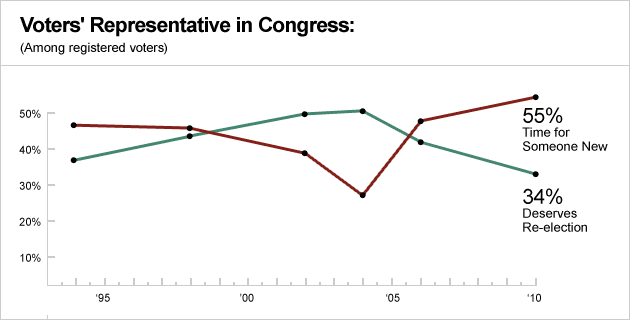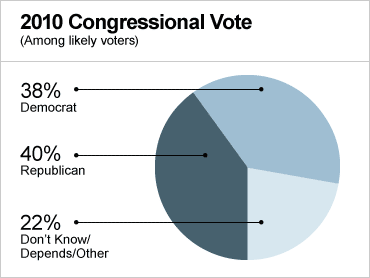Poll: Most Want New Blood in Congress
CBS News Poll analysis by the CBS News Polling Unit: Sarah Dutton, Jennifer De Pinto, Fred Backus and Anthony Salvanto.
Americans are dissatisfied with their representation in Congress, a new CBS News/New York Times poll shows, with just 34 percent of registered voters saying their own member of Congress deserves re-election.
Fifty-five percent, by contrast, say it's time to give someone new a chance. That's up from 47 percent in 2006 and 27 percent in 2004.
Asked about most members of Congress, voters are even harsher: just 12 percent say they deserve reelection, while 78 percent want someone new. Those figures are similar to findings in 2006, when Democrats took control of Congress, as well as 1994, when Republicans took over.
The approval rating for Congress, meanwhile, stands at a lowly 21 percent, down four points from 2006. Seventy percent disapprove of the job Congress is doing.
And while Americans are no fans of Congressional Democrats - 58 percent disapprove of their performance - they feel even worse about Congressional Republicans. Just 20 percent approve of their performance, while 68 percent disapprove.
The Midterm Elections:
Still, there is good news for Republicans heading into November: 58 percent of Republicans say they are more enthusiastic about voting this year than usual, compared to 47 percent of Democrats. Only 37 percent of independents say they are more enthusiastic this year.
And a higher percentage of Republicans (45 percent) than Democrats (34 percent) say they are paying a lot of attention to the campaign.
Likely voters are split on which party they prefer. If the midterm elections for the House of Representatives were held today, 40 percent say they would support the Republican candidate, while 38 percent would support the Democrat. About one in five says they are undecided.
President Obama's potential influence looks like something of a wash: 23 percent of registered voters say their vote in the midterms will be in support of the president, while 25 percent say it will be in opposition to him. Nearly half say the president, whose approval rating in the survey stands at 45 percent, will not be a factor in their vote.
When it comes to their response how candidates voted on two of the most controversial Democratic legislative achievements - the stimulus package and health care reform - registered voters were similarly divided.
Most - 57 percent - said a candidate's support for the stimulus bill made no difference in their vote. Nineteen percent said it made them more likely to vote for the candidate, and 22 percent said it made them less likely.
On the health care bill, 28 percent said a candidate's support made them more likely to vote for that candidate, while an identical percentage said it made them less likely to vote for him or her. Forty-one percent said it made no difference.
Forty-five percent of Americans view the Democratic Party favorably, while 48 percent view it unfavorably. The party's favorable rating has dropped seven points since 2006. Just 34 percent view the Republican party favorably, down seven points since 2006 and seventeen points since 2004.
Registered voters say Democrats are better than Republicans when it came to helping the middle class, helping small businesses, creating new jobs, and dealing with national problems. Republicans are said to be better at reducing the budget deficit and dealing with terrorism. Voters are divided on which party better handled the issue of immigration.
Voter Anger and the Tea Party Movement:
Fifty-two percent of registered voters say they're dissatisfied with Washington, and another 22 percent describe themselves as "angry." Just two percent are enthusiastic. Most angry voters say they will vote for Republicans in November.
Asked to volunteer what they are most angry about, 17 percent of self-described angry voters said partisan politics. Twelve percent said unemployment or the economy, while another 12 percent cited their feeling that the government isn't representing the people. Nine percent pointed to government spending or the deficit.
A majority of voters - 53 percent - said they favor a smaller government with fewer services. Far fewer - roughly one in three - backed a larger government with more services.
Amid the rise of the Tea Party movement, 54 percent of Americans say their country needs a new political party, matching the levels who said as much in the mid-nineties. Forty-two percent say two parties is enough.
Nearly half of registered voters declined to offer an opinion of the Tea Party movement. Twenty-three percent said they had a favorable view, while 29 percent had an unfavorable view.
Twenty-eight percent said a candidate's Tea Party affiliation would make them less likely to support that candidate, while just 14 percent said it would make them more likely. Half said it didn't make a difference.
Tea Party supporters, however, are among the most enthusiastic voters. Sixty-four percent say they are more enthusiastic about voting this year than in the past, compared to 43 percent of registered voters overall. Nearly eight in ten plan to vote for Republicans.
Nineteen percent of Americans overall support the Tea Party movement. Most are conservative and identify as either Republican (54 percent) or independent (38 percent).
More From The Poll:
Poll: Most Know Those With Anti-Muslim Feeling
Tea Party Supported by One in Five in New CBS News/NYT Poll
Poll: Most Americans Want Tax Cuts for the Rich to Expire
Poll: Obama Approval Rating Mixed, but Most See No Economic Progress
Most Say They Would Not Heed Palin Endorsements
This poll was conducted among a random sample of 990 adults nationwide, interviewed by telephone September 10-14, 2010. Phone numbers were dialed from random digit dial samples of both standard land-line and cell phones. 881 interviews were conducted among registered voters. The error due to sampling for results based on the entire sample could be plus or minus three percentage points.
This poll release conforms to the Standards of Disclosure of the National Council on Public Polls.

